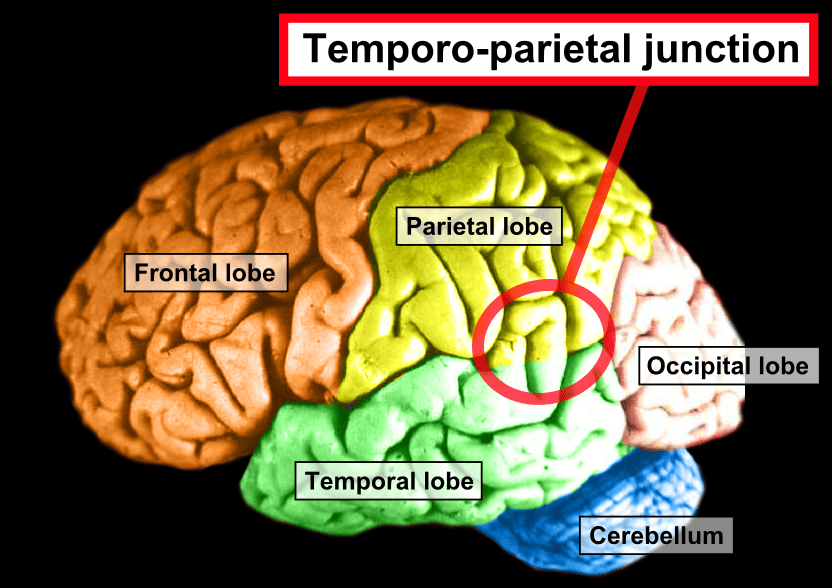A Temporoparietal Junction (RTPJ/LTPJ) Theory Of Relationship Scams
Understanding how Scam Victim’s Core Beliefs are Manipulated
Psychology of Scams
By:
• Tim McGuinness, Ph.D. – Anthropologist, Scientist, Director of the Society of Citizens Against Relationship Scams Inc.
• Vianey Gonzalez – Psychologist, Certified Deception Professional, Director of the Society of Citizens Against Relationship Scams Inc.
About This Article
The right and left temporoparietal junction (RTPJ/LTPJ) of the human brain, crucial in social cognition, empathy, and narrative processing, may play a role in trusting narratives told by scammers in relationship scams. Scammers exploit this region by crafting stories that activate empathy and trust, manipulating victims into believing false narratives.
This activation may inhibit victims’ acceptance of the scam, creating inner conflict. Additionally, psychological trauma may alter RTPJ/LTPJ function, affecting emotion processing and self-awareness.
Protecting against false narratives involves reflection, skepticism, research, and trusting intuition. Understanding these brain mechanisms can aid both in scam prevention and supporting scam survivors in their recovery journey.

Note: This article is intended for informational purposes and does not replace professional medical advice. If you are experiencing distress, please consult a qualified mental health professional.
Does The Right And Left Temporoparietal Junction (RTPJ/LTPJ) Of The Human Brain Play A Role In Believing Narratives Or Stories Communicated To Scam Victims By Criminals In Trust-Based Relationship Scams Or Fraud?
Please Note: This article about the right and left temporoparietal junction is for educational purposes and is not intended to diagnose any disease or mental disorder. Understanding the functions of the human mind can have a large impact on both helping the public avoid scams and fraud, as well as helping the survivors of these crimes to better understand why they happened and for professionals to better aid in their recovery.
What are the Right and Left Temporoparietal Junction (RTPJ/LTPJ)
The right and left temporoparietal junction (RTPJ/LTPJ) is a region of the brain that is involved in a number of cognitive functions, including social cognition, empathy, and narrative processing. It is thought that the RTPJ/LTPJ plays a role in helping us to believe narratives or stories, including false stories that are communicated to us, especially when those narratives are told by people we trust.
According to Wikipedia:
The temporoparietal junction (TPJ) is an area of the brain where the temporal and parietal lobes meet, at the posterior end of the lateral sulcus (Sylvian fissure). The TPJ incorporates information from the thalamus and the limbic system as well as from the visual, auditory, and somatosensory systems. The TPJ also integrates information from both the external environment as well as from within the body. The TPJ is responsible for collecting all of this information and then processing it.
This area is also known to play a crucial role in self–other distinctions processes and theory of mind (ToM). Furthermore, damage to the TPJ has been implicated in having adverse effects on an individual’s ability to make moral decisions and has been known to produce out-of-body experiences (OBEs). Electromagnetic stimulation of the TPJ can also cause these effects. Apart from these diverse roles that the TPJ plays, it is also known for its involvement in a variety of widespread disorders including anxiety disorders, amnesia, Alzheimer’s disease, autism spectrum disorder, and schizophrenia.
Much of the above understanding of the temporoparietal junction is based on the work of Dr. Rebecca Saxe of MIT
How Criminals May Exploit the Right and Left Temporoparietal Junction
Criminals in trust-based relationship scams or fraud often exploit the temporoparietal junction RTPJ/LTPJ by telling victims stories that are designed to elicit empathy and trust.
For example, a scammer may pose as a soldier fighting overseas and tell a victim that they need money to come home. Or, a scammer may pose as a romantic interest and tell a victim that they need money to help them through a difficult time.
These stories are often very believable, and they can be very effective at manipulating victims. This is because the stories activate the RTPJ/LTPJ, which is the part of the brain that helps us to understand and respond to the emotions of others.
When the temporoparietal junction RTPJ/LTPJ is activated, we are more likely to believe the stories that are being told to us, even if they are not true. This is because the RTPJ/LTPJ helps us to create a mental model of the situation, and this mental model can be biased by our emotions.
In the case of trust-based relationship scams or fraud, the scammer’s story is designed to elicit feelings of empathy and trust. These feelings then activate the RTPJ/LTPJ, which makes it more likely that the victim will believe the story and send money to the scammer.
Believing False Stories and the Temporoparietal Junction
How the right and left temporoparietal junction RTPJ/LTPJ functions in believing false stories
The temporoparietal junction RTPJ/LTPJ is involved in a number of processes that are important for believing stories.
- First, it is involved in understanding the meaning of words and phrases. This allows us to understand the content of a story and to track the plot.
- Second, the RTPJ/LTPJ is involved in inferring the intentions and emotions of others. This allows us to understand the characters in a story and to empathize with them.
- Finally, the RTPJ/LTPJ is involved in creating mental models of the world. This allows us to imagine the events described in a story and to place them in the context of our own knowledge and experience.
When we hear a story, the RTPJ/LTPJ is activated and it begins to process the information. The RTPJ/LTPJ uses this information to create a mental model of the story. This mental model includes the characters, the setting, the plot, and the themes of the story.
If the story is believable, the RTPJ/LTPJ will create a mental model that is consistent with our own knowledge and experience. This will make us more likely to believe the story.
However, if the story is false, the RTPJ/LTPJ may still create a mental model of the story. This is because the RTPJ/LTPJ is not perfect at distinguishing between true and false information.
In fact, the temporoparietal junction RTPJ/LTPJ is more likely to create a mental model of a story if the story is emotionally engaging. This is because the RTPJ/LTPJ is highly sensitive to emotions.
Scammers appear to often exploit this by telling stories that are designed to elicit empathy and trust.
These stories are often very believable, and they can be very effective at manipulating victims. This is because the stories activate the RTPJ/LTPJ, which is the part of the brain that helps us to understand and respond to the emotions of others.
When the RTPJ/LTPJ is activated, we are more likely to believe the stories that are being told to us, even if they are not true. This is because the RTPJ/LTPJ helps us to create a mental model of the situation, and this mental model can be biased by our emotions.
The Relationship Between the Amygdala & the Temporoparietal Junction
It is possible that amygdala hijacks play a role in the activation or alteration of the right and left temporoparietal junction (RTPJ/LTPJ) functions in contributing to believing the false stories that scam victims receive from the criminals engaged in relationship scams.
The amygdala is a brain region that is involved in processing emotions, especially fear and aggression. The temporoparietal junction RTPJ/LTPJ is a brain region that is involved in processing social information, such as understanding the intentions and emotions of others.
When someone is experiencing an amygdala hijack (emotional hijack,) the amygdala takes over control of the brain and overrides other brain regions, such as the prefrontal cortex. The prefrontal cortex is involved in higher-order thinking processes, such as reasoning and decision-making.
When the amygdala is in control, it can be difficult to think clearly and rationally. This can make people more susceptible to manipulation and deception.
Scammers often use techniques that are designed to trigger an amygdala hijack in their victims and sustain these hijacks over time. For example, they may create a sense of urgency or fear in their victims. They may also use flattery or other forms of manipulation to gain their victims’ trust and then control them.
Once a scammer has gained a victim’s trust, they may start telling them stories that are designed to elicit empathy and compassion. These stories may be false or exaggerated, but they can be very effective at manipulating victims.
The amygdala hijack may play a role in making victims more likely to believe these stories. When the amygdala is in control, it can be difficult to think critically about the information that is being presented. This can make people more likely to accept false or misleading information.
In addition, the amygdala hijack may also alter the functions of the temporoparietal junction RTPJ/LTPJ. When the amygdala is in control, it can interfere with the ability of the RTPJ/LTPJ to function properly.
This can make it difficult for victims to accurately assess the intentions and emotions of the scammers. This can make them more likely to be deceived by the scammers’ stories.
It is important to note that more research is needed to understand the role of amygdala hijacks in relationship scams. However, the available evidence suggests that amygdala hijacks may play a role in making victims more susceptible to manipulation and deception.
The Role of the Temporoparietal Junction (RTPJ/LTPJ) and Processing Grief
The temporoparietal junction (RTPJ/LTPJ) also plays a role in the processing of grief.
It is thought that the RTPJ/LTPJ plays a role in helping us to process grief by allowing us to understand and respond to the emotional pain that we are feeling. But it may also help to prevent the processing of grief.
When we experience grief, the RTPJ/LTPJ is activated. This activation helps us to process the emotional pain of grief and to understand the loss that we have experienced. The RTPJ/LTPJ also helps us to empathize with others who are grieving and to provide them with support.
In addition, the RTPJ/LTPJ is involved in creating mental models of the world. This allows us to understand the events that have led to our loss and to place them in the context of our own knowledge and experience. The RTPJ/LTPJ also helps us to imagine the future without our loved one and to adjust to our new reality.
The RTPJ/LTPJ is an important brain region that plays a key role in the processing of grief. By understanding how the RTPJ/LTPJ works, we can better understand the grieving process and how to support those who are grieving.
Temporoparietal Junction (RTPJ/LTPJ) and Psychological Trauma
The temporoparietal junction (RTPJ/LTPJ) plays a role in many psychological processes, including an important brain region involved in the processing of psychological trauma.
Here are some specific ways in which the RTPJ/LTPJ plays a role in psychological trauma:
- Processing trauma-related memories: The RTPJ/LTPJ is involved in the processing and storage of memories, including trauma-related memories. Trauma-related memories can be very vivid and intrusive, and they can lead to a variety of symptoms, such as flashbacks, nightmares, and anxiety. The RTPJ/LTPJ is thought to play a role in regulating the intensity of trauma-related memories and in helping us to integrate them into our overall life narrative.
- Understanding the emotions of others: The RTPJ/LTPJ is also involved in helping us to understand the emotions of others. This is important for trauma survivors, as they often have difficulty trusting others and understanding their own emotions. The RTPJ/LTPJ can help trauma survivors to develop empathy for others and to build meaningful relationships.
- Coping with the psychological effects of trauma: The RTPJ/LTPJ is also involved in helping us to cope with the psychological effects of trauma. Trauma can lead to a variety of symptoms, such as anxiety, depression, and post-traumatic stress disorder (PTSD). The RTPJ/LTPJ can help us to regulate our emotions, to manage stress, and to develop coping mechanisms.
An additional function may be that the temporoparietal junction (RTPJ/LTPJ) may inhibit acceptance of the fact that a crime happened when it had previously helped the scam victim to believe in the scam story, creating a conflict inside the mind of the victim – that appears to be denial.
In addition to the above, the RTPJ/LTPJ is also involved in the following psychological processes, which are relevant to trauma:
- Theory of mind: Theory of mind is the ability to understand the mental states of others, including their thoughts, beliefs, and intentions. The RTPJ/LTPJ is thought to play a key role in the theory of mind. Trauma survivors often have difficulty with the theory of mind, which can make it difficult for them to understand the intentions of others and to form meaningful relationships.
- Mentalizing: Mentalizing is the process of thinking about our own mental states and the mental states of others. The RTPJ/LTPJ is thought to play a role in mentalizing. Trauma survivors often have difficulty with mentalizing, which can make it difficult for them to understand their own emotions and the emotions of others.
- Self-awareness: Self-awareness is the ability to understand and reflect on our own thoughts, feelings, and behaviors. The RTPJ/LTPJ is thought to play a role in self-awareness. Trauma survivors often have difficulty with self-awareness, which can make it difficult for them to understand their own reactions to trauma and to develop coping mechanisms.
Changes to the Temporoparietal Junction (RTPJ/LTPJ) following Psychological Trauma
The temporoparietal junction (RTPJ/LTPJ) is a brain region that is involved in a variety of cognitive functions, including social cognition, empathy, and narrative processing. It is also thought to play a role in the processing of psychological trauma.
Studies have shown that there are a number of changes in the RTPJ/LTPJ following significant psychological trauma. These changes can include:
- Reduced activity: Studies have shown that people with PTSD have reduced activity in the RTPJ/LTPJ when viewing images of people with emotional expressions. This suggests that people with PTSD may have difficulty understanding and responding to the emotions of others.
- Increased activity: Other studies have shown that people with PTSD have increased activity in the RTPJ/LTPJ when viewing images of people with fearful expressions. This suggests that people with PTSD may be hyperaware of the fear of others, which could lead to hypervigilance and anxiety.
- Altered connectivity: Studies have also shown that the RTPJ/LTPJ is less well-connected to other brain regions in people with PTSD. This suggests that the RTPJ/LTPJ may not be functioning as effectively as it should in people with PTSD.
The changes in the RTPJ/LTPJ following significant psychological trauma are thought to contribute to a number of the symptoms of PTSD, such as difficulty understanding and responding to the emotions of others, hypervigilance, and anxiety.
It is important to note that the changes in the RTPJ/LTPJ following significant psychological trauma are reversible. With treatment, such as therapy and medication, people with PTSD can experience changes in their RTPJ/LTPJ that are associated with a reduction in symptoms.
There are no specific medications that we are aware of that have been developed to work on the temporoparietal junction (RTPJ/LTPJ) to help restore it to normal function. However, there are a number of medications that are used to treat the symptoms of PTSD, which is a condition that is thought to involve impaired function of the RTPJ/LTPJ. If you want to explore that please consult with a mental health professional.
How to Protect Yourself from Believing False Stories
Here are some thought, mind, & behavioral exercises or actions that can help to counter how the right and left temporoparietal junction (RTPJ/LTPJ) would tend to cause a scam victim to believe false stories:
- Take a step back and reflect on the situation. When you are feeling pressured, rushed, or emotional, it can be difficult to think clearly. Take time to calm down and think about the situation rationally. Let your emotions level out.
- Ask yourself if the story makes sense. Scammers often tell stories that are too good to be true or that have obvious plot holes. If the story doesn’t make sense, it’s probably a scam. Tell the story to a trusted friend or family member. Often the retelling of a story or plot line will help you identify falsehoods and issues.
- Do your research. If you are unsure about something, look it up online or talk to a trusted friend or family member. Scammers often lie about their identities or about situations. Test their local knowledge as a way of tripping them up.
- Be skeptical of emotional appeals. Scammers often try to manipulate their victims by appealing to their emotions, such as their sense of pity or greed. Don’t let your emotions get the best of you. They will even bring in imaginary family members or children to manipulate you.
- Trust your intuition. If you have a bad feeling about something, it’s probably best to err on the side of caution and walk away. Often with the amygdala in control, the logical part of your brain can only give you a whisper of caution.
Remember
Remember, these crimes work because of our brains. If you were scammed it was only because you are human and have a brain – even dogs and cats can be scammed! You are not to blame – it was not your fault that your own brain worked against you!

Please Note
These are complex concepts and we present this theory and information to help educate scam victims and professionals about the complexities of the mind and the impacts of relationship scams and other types of fraud. Additional research and study are needed to better understand these brain functions and processes so that it may lead to better approaches to therapy, as well as support and recovery mechanisms.
More:
- Temporoparietal junction – Wikipedia
- Temporo-parietal cortex involved in modeling one’s own and others’ attention | eLife (elifesciences.org)
- fMRI item analysis in a theory of mind task (mit.edu)
- Saxe, R., & Kanwisher, N. (2003). People thinking about thinking people: The role of the temporo-parietal junction in “theory of mind”
- What Really Are Vulnerabilities That Lead To Scams? (scamsnow.com)
- Magical Thinking – How Biased & Delusional Thinking Enslaves Scam Victims (scamsnow.com)
- The Psychology of Scams (romancescamsnow.com)
SCARS Resources:
- For New Victims of Relationship Scams newvictim.AgainstScams.org
- Subscribe to SCARS Newsletter newsletter.againstscams.org
- Sign up for SCARS professional support & recovery groups, visit support.AgainstScams.org
- Find competent trauma counselors or therapists, visit counseling.AgainstScams.org
- Become a SCARS Member and get free counseling benefits, visit membership.AgainstScams.org
- Report each and every crime, learn how to at reporting.AgainstScams.org
- Learn more about Scams & Scammers at RomanceScamsNOW.com and ScamsNOW.com
- Global Cyber Alliance ACT Cybersecurity Tool Website: Actionable Cybersecurity Tools (ACT) (globalcyberalliance.org)
- Self-Help Books for Scam Victims are at shop.AgainstScams.org
- Donate to SCARS and help us help others at donate.AgainstScams.org
- Worldwide Crisis Hotlines: International Suicide Hotlines – OpenCounseling : OpenCounseling
- Campaign To End Scam Victim Blaming – 2024 (scamsnow.com)
-/ 30 /-
What do you think about this?
Please share your thoughts in a comment below!
More ScamsNOW.com Articles
-/ 30 /-
What do you think about this?
Please share your thoughts in a comment above!
SCARS LINKS: AgainstScams.org RomanceScamsNOW.com ContraEstafas.org ScammerPhotos.com Anyscam.com ScamsNOW.com
reporting.AgainstScams.org support.AgainstScams.org membership.AgainstScams.org donate.AgainstScams.org shop.AgainstScams.org
youtube.AgainstScams.org linkedin.AgainstScams.org facebook.AgainstScams.org
ARTICLE RATING
TABLE OF CONTENTS
CATEGORIES
MOST POPULAR COMMENTED ARTICLES
POPULAR ARTICLES
U.S. & Canada Suicide Lifeline 988
![NavyLogo@4x-81[1]](https://scamsnow.com/wp-content/uploads/2025/04/NavyLogo@4x-811.png)
ARTICLE META
WHAT PEOPLE ARE TALKING ABOUT LATEST SITE COMMENTS
See Comments for this Article at the Bottom of the Page
on Scam Victims Use Work To Avoid Healing: “The last 6 years have been the most difficult of my life. The pandemic, having both parents in the hospital…” Jun 29, 18:38
on Entitlement Mentality And How Scam Victims Often Lose Their Path To Recovery – 2024: “Thank you for this discussion of entitlement. I can see from the descriptions listed that I have not felt entitlement.…” Jun 29, 18:22
on Samurai Wisdom and Rituals for Clearing the Mind After Scam Trauma – 2025 – [VIDEOS]: “A great guide on how to move forward in our recovery process with a calm mind, cleansed on an ongoing…” Jun 28, 07:34
on Delayed Gratification and Patience in Scam Victim Recovery – 2025 – [VIDEOS]: “We want to recover quickly and… we make new mistakes. How not to speed up the recovery process, how to…” Jun 28, 06:41
on The Unique Injury Of Betrayal Trauma On Scam Victims – 2024: “Primarily because you did not see it coming” Jun 27, 23:57
on Changes In A Scam Victim’s Life: “I really detest the way my trust in others has been affected by the scamming I went through. I used…” Jun 27, 14:47
on The Unique Injury Of Betrayal Trauma On Scam Victims – 2024: “Betrayal Trauma is the worst feeling ever. Why does it seem so much worse when a scammer does that to…” Jun 27, 14:34
on EMDR Therapy For Scam Victims’ Trauma – A Part Of The Recovery Process For Many – 2024: “Very comprehensive article explaining all aspects of EMDR. I’d only heard of it before and now I have a much…” Jun 26, 19:01
on Forgiving Yourself After Surviving a Romance or Investment Scam – 2025: “Thank you for this valuable article. Self-forgiveness was for me the biggest step that led to my recovery. That also…” Jun 26, 17:28
on Counseling And Your Native Language: “These points make perfect sense. I can’t imagine trying to express complex emotions in a second language. I realize many…” Jun 26, 16:05
on Thought-Terminating Cliches – How What You and Others Say Stops Critical Thinking and Recovery for Scam Victims – 2025: “I didn’t realize that these “innocent phrases” clichés ending thoughts, can have such effect / negative -inhibiting / on our…” Jun 26, 14:48
on Scam Victim Resistance In Support Groups Therapy Or Counseling Can Destroy Opportunities For Recovery – 2024: “Working with either a support group or therapist to me means a self commitment to actively participating in the therapy.…” Jun 24, 21:01
on ‘I Just Want To Forget It’ – Denial & Avoidance Are Natural But Will Not Help Scam Victims On Their Path To Recovery From Scams – 2024: “My financial loss, the shock and betrayal of the crime ending all combined to fray my nerves and spend hours…” Jun 24, 20:10
on You Hate Being Told What To Do? How Your Rebellious Mentality Can Sabotage Your Recovery – 2025: “I am a bit of a rebel, and the moment someone tells me to do something, worse, does it even…” Jun 24, 15:04
on You Hate Being Told What To Do? How Your Rebellious Mentality Can Sabotage Your Recovery – 2025: “You are very welcome” Jun 24, 03:01
on You Hate Being Told What To Do? How Your Rebellious Mentality Can Sabotage Your Recovery – 2025: “This is a great article, which makes perfect sense as to why anyone would resist the help offered to them.…” Jun 23, 20:01
on Scam Victims’ Responsibilities – 2021 [Updated 2025]: “Thank you for this article. As I continue my journey, I focus on the here and now and let the…” Jun 21, 16:26
on Scam Victims Avoid Or Escape The Aftermath Of Scams – How Denial And Distraction Avoid Confronting Reality – 2024: “In the earliest days after my crime I felt powerless, helpless and weak. I had been through so much in…” Jun 21, 14:46
on Problems and Opportunities – Thoughts on Psychological Reframing – 2025: “An article that really helped me look at the problems in my life from a different point of view and…” Jun 21, 14:42
Important Information for New Scam Victims
Please visit www.ScamVictimsSupport.org – a SCARS Website for New Scam Victims & Sextortion Victims
SCARS Institute now offers a free recovery program at www.SCARSeducation.org
Please visit www.ScamPsychology.org – to more fully understand the psychological concepts involved in scams and scam victim recovery
If you are looking for local trauma counselors, please visit counseling.AgainstScams.org
If you need to speak with someone now, you can dial 988 or find phone numbers for crisis hotlines all around the world here: www.opencounseling.com/suicide-hotlines
Statement About Victim Blaming
Some of our articles discuss various aspects of victims. This is both about better understanding victims (the science of victimology) and their behaviors and psychology. This helps us to educate victims/survivors about why these crimes happened and not to blame themselves, better develop recovery programs, and help victims avoid scams in the future. At times, this may sound like blaming the victim, but it does not blame scam victims; we are simply explaining the hows and whys of the experience victims have.
These articles, about the Psychology of Scams or Victim Psychology – meaning that all humans have psychological or cognitive characteristics in common that can either be exploited or work against us – help us all to understand the unique challenges victims face before, during, and after scams, fraud, or cybercrimes. These sometimes talk about some of the vulnerabilities the scammers exploit. Victims rarely have control of them or are even aware of them, until something like a scam happens, and then they can learn how their mind works and how to overcome these mechanisms.
Articles like these help victims and others understand these processes and how to help prevent them from being exploited again or to help them recover more easily by understanding their post-scam behaviors. Learn more about the Psychology of Scams at www.ScamPsychology.org
SCARS INSTITUTE RESOURCES:
If You Have Been Victimized By A Scam Or Cybercrime
♦ If you are a victim of scams, go to www.ScamVictimsSupport.org for real knowledge and help
♦ Enroll in SCARS Scam Survivor’s School now at www.SCARSeducation.org
♦ To report criminals, visit https://reporting.AgainstScams.org – we will NEVER give your data to money recovery companies like some do!
♦ Follow us and find our podcasts, webinars, and helpful videos on YouTube: https://www.youtube.com/@RomancescamsNowcom
♦ Learn about the Psychology of Scams at www.ScamPsychology.org
♦ Dig deeper into the reality of scams, fraud, and cybercrime at www.ScamsNOW.com and www.RomanceScamsNOW.com
♦ Scam Survivor’s Stories: www.ScamSurvivorStories.org
♦ For Scam Victim Advocates visit www.ScamVictimsAdvocates.org
♦ See more scammer photos on www.ScammerPhotos.com
You can also find the SCARS Institute on Facebook, Instagram, X, LinkedIn, and TruthSocial
Psychology Disclaimer:
All articles about psychology and the human brain on this website are for information & education only
The information provided in this and other SCARS articles are intended for educational and self-help purposes only and should not be construed as a substitute for professional therapy or counseling.
Note about Mindfulness: Mindfulness practices have the potential to create psychological distress for some individuals. Please consult a mental health professional or experienced meditation instructor for guidance should you encounter difficulties.
While any self-help techniques outlined herein may be beneficial for scam victims seeking to recover from their experience and move towards recovery, it is important to consult with a qualified mental health professional before initiating any course of action. Each individual’s experience and needs are unique, and what works for one person may not be suitable for another.
Additionally, any approach may not be appropriate for individuals with certain pre-existing mental health conditions or trauma histories. It is advisable to seek guidance from a licensed therapist or counselor who can provide personalized support, guidance, and treatment tailored to your specific needs.
If you are experiencing significant distress or emotional difficulties related to a scam or other traumatic event, please consult your doctor or mental health provider for appropriate care and support.
Also read our SCARS Institute Statement about Professional Care for Scam Victims – click here
If you are in crisis, feeling desperate, or in despair, please call 988 or your local crisis hotline.
More ScamsNOW.com Articles
A Question of Trust
At the SCARS Institute, we invite you to do your own research on the topics we speak about and publish. Our team investigates the subject being discussed, especially when it comes to understanding the scam victims-survivors’ experience. You can do Google searches, but in many cases, you will have to wade through scientific papers and studies. However, remember that biases and perspectives matter and influence the outcome. Regardless, we encourage you to explore these topics as thoroughly as you can for your own awareness.














![scars-institute[1]](https://scamsnow.com/wp-content/uploads/2025/04/scars-institute1.png)
![niprc1.png1_-150×1501-1[1]](https://scamsnow.com/wp-content/uploads/2025/04/niprc1.png1_-150x1501-11.webp)

My PBS certainly was a story teller. She had stories of how we would be spending the rest of our lives together living of the wealth we were creating trading Bitcoin.